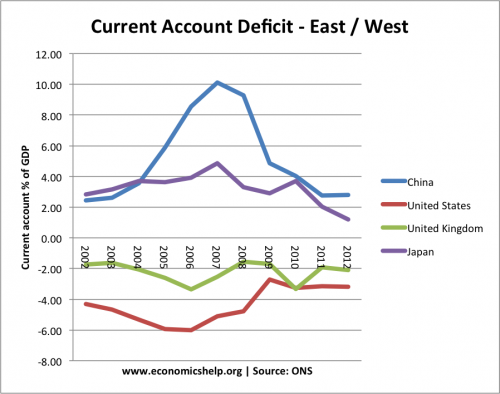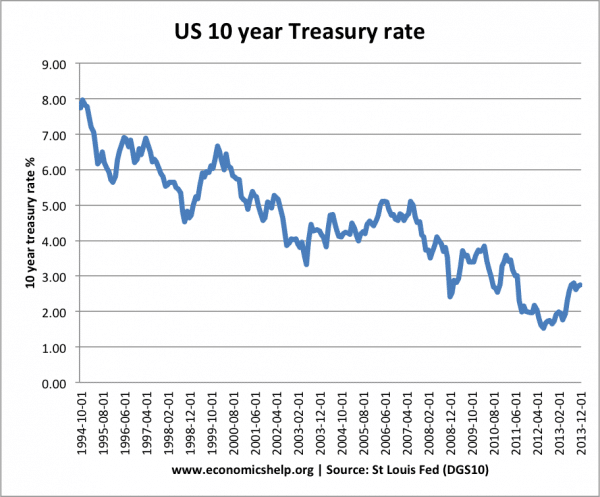Readers Question:
“As for the argument that China can always use its foreign exchange (forex) reserves to provide further stimulus to prop up the economy, the people who purport this have little knowledge of basic economics.
If China were to use substantial forex reserves in this way, it would become a large net-seller of U.S. Treasury bonds. To prevent a spike in interest rates, the U.S. central bank would have to significantly step up purchases, funded ultimately by private citizens savings. Less of these savings would dampen U.S. consumption and ultimately, Chinese exports to the US.. In other words, a move by China to substantially cut forex reserves would not only be a disaster for the developed world but for China itself.”
China has built up substantial dollar assets, (US treasuries) China has done this for various reasons, including:
- It wants to make use of its current account surplus.
- In the past it has sought to keep the Chinese currency undervalued. Buying dollar assets keeps the Chinese currency weak, making Chinese exports more competitive boosting Chinese economic growth. (see: Chinese currency manipulation)
It is estimated that China has over $3.6 trillion of foreign reserves (Bloomberg). Approximately, 60%, of these are in dollar assets. This includes $1,294 trillion of US Treasuries (US government debt). China is the biggest foreign creditor to the US.
However, China has signalled that it will be seeking to hold less foreign reserves and reduce the % of reserves held in dollars – diversifying into other currencies.
Now, the question is what will happen to US / Chinese and Global economy if they start selling these dollar assets.
Impact on Chinese economy of selling US Treasuries
- Appreciation in the Yuan and depreciation in the US dollar. If China sold US assets and held more of its own currency, it would cause an appreciation in the Yuan and fall in the value of the dollar. This would reduce the competitiveness of Chinese exports, leading to lower Chinese economic growth, and possible higher unemployment.
- Reduction in Chinese current account surplus.

In the past few years, we have seen a reduction in China’s current account surplus, a sell off of dollars assets would reduce this deficit by even more. - Selling foreign assets could be used to boost domestic demand by financing state investment. This could help offset the likely fall in exports. However, the concern would be whether the state could satisfactorily invest the large foreign currency reserves. It may be more inefficient that the private sector exports affected by the appreciation.
- Reducing inflationary pressures. An appreciation in the Yuan will reduce inflationary pressure in China.
How would the sale of dollar assets affect the US economy?
China holds considerable amounts of US debt. If China stopped buying US treasuries, it would cause a few effects:
Upward pressure on US interest rates. If there is less demand for US Treasury bonds, this will push up interest rates. Making it more expensive for the US to borrow. If China became a big sellers, it might also adversely affect confidence in US Treasuries causing other investors to demand higher rates too.
Higher interest rates on government bonds may push up general interest rates, and may cause lower economic growth in the US. Higher rates increase the cost of borrowing and discourage investment and spending.
However, it is important to bear in mind Chinese holdings of US debt is sometimes exaggerated.
Oct 2012, China holds $1,169 out of a total foreign holdings of $5,526 (20%) (US Treasury) It is less than 8% of total US debt. Therefore, the impact on US interest rates is not necessarily critical if China reduces demand for US Treasuries.
It should be remembered US interest rates are close to an all time low (see above). Higher interest rates are not necessarily the end of the US economy. As long as domestic demand is reasonably strong, the US can cope with higher interest rates on US Treasuries.
Also, if China did sell US Treasuries, you may see the Federal Reserve delay its tapering and reversal of Quantitative easing. The US Treasury could absorb some of these Chinese sales by delaying its tapering programme.
I also don’t necessarily agree with the statement that if the US Central Banks steps up purchases of Treasury bills, it will have to do this through reducing private sector saving. Quantitative easing has involved the creation of money to purchase bills, it is not taking from private sector saving.
Boost to US exports
The above statement also ignores the boost to US exports. If the dollar falls in value, it will help boost US exports to China. This will increase US export demand and help reduce the trade deficit of US with China.
Conclusion
I don’t believe that if China starts to sell its foreign reserves it needs to be an economic disaster. In some ways it will help to end the imbalance between China and US, devaluing the dollar and boosting US exports. It may also help China by reducing inflationary pressure and increasing the incentive for exporters to be more competitive.
Also, it is unlikely we will see a radical swing in Chinese foreign currency holdings. I doubt they will suddenly start to sell all their dollar holdings. They own so much dollar assets, they have a vested interest in keeping the dollar reasonably stable.
Related


Question to the below statement:
“Appreciation in the Yuan and depreciation in the US dollar: If China sold US assets and held more of its own currency, it would cause an appreciation in the Yuan and fall in the value of the dollar.”
Before China exchanges the US dollars into the Yuan, which will depreciate the US dollar and appreciate the Yuan, it will have to collect the US dollars from the market as a result of its sales of the US assets. This should strenghten the US dollar. Given the above, it seems that the impact of those transactions on the value of the US dollar should be cancelled out (first up, then down), right?
Thank you for the answer and clarification.
Alex